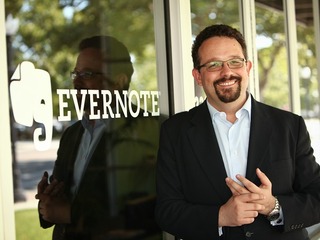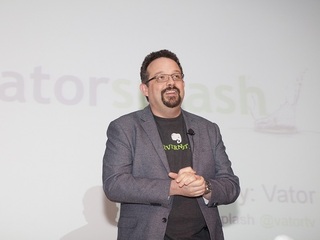
Libin: when, what and wa-how to be an entrepreneur
Get the timing right, try to improve something that already exists and get an identity mug

At last week's Vator Splash SF, Evernote CEO Phil Libin took the stage to share with the audience some of his best advice on what it means to be an entrepreneur.
Having been a CEO for most his adult life, Libin said, he has boiled his advice down to six basic questions of entrepreneurship: who, why, when, where, what and wa-how.
Last week I wrote about what Libin believes is the the who, the why and the where of being an entreprenuer. This is part two of his speech, covering the when, what and wa-how of being an entrepreneur. (I'm sure you're all wondering what exactly "wa-how" is, but you're going to have to keep reading to find out!)
When should you be an entrepreneur?
The when of starting a new business is a lot like comedy, Libin said. It's all about timing!
"The right timing is you wait until the world changes, so that a really important problem moves from being impossible to just being really, really hard. And then you execute."
Make sure that the problem you are trying to solve is important, and not trivial, he noted.
Even more important: don't do it too soon, he said, or you're trying to solve an impossible problem, which takes a lot of work an you won't get anywhere. But you also can't wait too long.
If it goes from being really, really hard to just kind of hard, or not hard at all, its too late. Someone else has already solved the problem and you're already behind. Figuring out where you are on that scale is "a really important question," Libin said.
"What has changed in the world to make your idea really, really hard for the first time? And why hasn't anyone else done it?"
Being able to see when the timing was right is all hindsight. Evernote, for example, is "maybe the least original idea in the history of technology," he said. But the bet that the company took was that the timing was right.
Networks and smart phones and devices had become ubiquitous and "we thought the world has just shifted so that solving that problem, holding an external brain, would go from something that you should only do for a very niche, a very small number of people, tens of thousands of people, and now, if you tried really hard you could do it for a billion people."
Another company that got the timing right, he said, was Facebook, which only a few years earlier "would have been MySpace, since the world, technology, the understanding wasn't there yet.
What should you build?
The "fetish of the idea" is "probably the biggest misconception in entrepreneurship," Libin said.
It is a common misconception that the people who found a company have a brilliant, staggering, new idea. That it is something that never existed before, and that is what makes a successful company.
"That almost never happens," he said. In fact, almost all successful companies were not the first in their field, including Evernote, which Libin again called "the least original idea in technology."
When trying to raise money early on, Libin gave the world's worst VC pitch, which went something like this:
"Hi, my name is Phil Libin. You've never heard of me. We have this company called Evernote and we're going use computers and phones to write things down. And we're going to give it away for free. Please give me $10 million."
This got him thrown out most of the time, especially when he pointed out that every phone and computer ever came with a free note taking app, so the point is that the idea doesn't matter as much as how it is presented.
"It turns out that the idea doesn't matter, the initial idea doesn't matter, what matters is 'what's the execution?'"
It is amazingly difficult, and takes a brilliant mind, to look at the world and to see what is missing; what it does not have, but that it should have. And yet this is how most people try to start a new company. A better way, Libin said, is to see what is already there that "kind of sucks" and improve upon it.
"Find something that people are already doing that they don't like," said Libin. Most companies that are successful started out that way.
Google wasn't the first search engine, Facebook wasn't the first social network, Apple didn't make the first computer, smartphone or media player. But they all saw something that could be better and that is what they gave people.
Wa-how
So we have finally come to "wa-how."
So here is what Wa-how is: it's what happens when someone starts asking "why?" but then switches to "how?" in the middle, making "wa-how." (Libin's advice for when someone asks "wa-how?" is to look them right in the eye and say, "I'll tell you wa-how!")
There are a lot of tips and tricks to wa-how, Libin said.
For one, it's really important to have an "identity mug," aka a coffee mug that says something on it that you carry around with you all the time, around the office so that it becomes associated with you. And you have to think carefully about the mug will say about you.
"It shouldn't be too crazy. This is a brand you're going to grow into. It has to be unusual but not super fashionable, not too racy. This is a mug that's going to have to your identity as you go from being a start-up CEO to a public, Fortune 500 CEO."
Libin's current identity mug is from The Empire Strikes Back. Oh, and one more tip: buy a bunch and hide all but one. That way, if you lose it, or someone tries to steal it, you haven't wasted 18 months trying to build up an identity, only to have to start again!
Libin ended his speech with one last piece of advice: ignore conventional wisdom, because almost everything that you hear is wrong.
And that is because things only become conventional wisdom because it is easy to repeat, not because its true, and it makes the person saying it sound smart. (Except, of course the stuff that Libin himself says. That is all true.)
The biggest piece of conventional wisdom is that a start-up should be disruptive, Libin said. And while that does happen, and companies have become successful by disrupting existing industries, it is more of a small, unintended side effect "that is not the central goal, or the central way, that you should be going about thinking about how to build your company."
"In other words, the perception is that the value that you create, as a new company and technology, is somehow proportional to what you distrupt. Somehow proportional to the value that you take away from somebody else. But that's completely wrong."
But entrepreneurs should refuse to play the zero sum game, he said. It's not about winning, its about succeeding.
Take, for example the iPod versus the Zune. Whereas Apple was trying to create a better MP3 player, because the ones that already existed were terrible, Microsoft was simply trying to take market share away from Apple.
Trying to move someone else's value into your own pocket is uninteresting, and a waste of your life and time.
So there you have it. That is the who, why, when, where, what and wa-how of being a successful entrepreneur.
Related Companies, Investors, and Entrepreneurs
Evernote
Startup/Business
Joined Vator on
Our goal at Evernote is to give everyone the ability to easily capture any moment, idea, inspiration, or experience whenever they want using whichever device or platform they find most convenient, and then to make all of that information easy to find.
And we’ve done just that. From creating text and ink notes, to snapshots of whiteboards and wine labels, to clips of webpages, Evernote users can capture anything from their real and digital lives and find it all anytime.
Evernote is an independent, privately held company headquartered in Mountain View, California. Major investors include Sequoia Capital, Morgenthaler Ventures, Troika Dialog, and DOCOMO Capital.

Phil Libin
Joined Vator on
Related News


